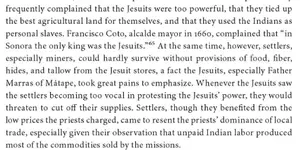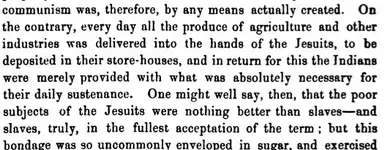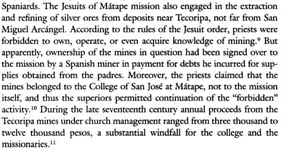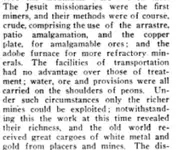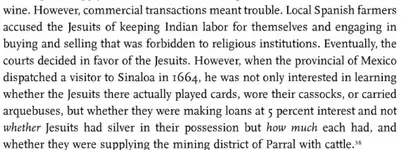Cactusjumper wrote
Springfield,
Agreed. Being the least knowledgeable person here on the actions of the Jesuits in Mexico.....I will move on.
Who said that you were "least knowledgeable"?

I see no reason for you to leave this discussion.
ConceptualizedNetherlandr wrote:
Can anybody steer me to treasure that actually exists?
Perhaps some other avocation might be more suited to you?

This thread is a debate over whether the legends of Jesuit treasures are real or not, plenty of evidence both pro and con has been posted if you wish to read it in the past several years of posts, some 118 pages plus still more in the thread on the Molina documents. In fact this part of the forum is "
Treasure Legends" not
"treasure, here it is just go pick it up". That kind of treasure is usually already dug up and gone, like the Atocha. From what I have seen of your approach to this topic, it looks like treasure hunting
might not be your bag; you seem to want a
sure thing which unfortunately
there is no such thing in treasure hunting. Of course if you do
not search, you very definitely
will never find anything either.
Springfield's post describes the debate very well - there are Jesuit mines and there is missing treasure, like the estimated $20,000 worth of silver seen at San Xavier del Bac mission, which is missing today. Supposedly it was hidden in the silver mine in the area known as La Esmerelda, however no one knows where the mine is either.
This is the kind of treasure we are debating. Jesuits must take a vow of
PERSONAL POVERTY so
will always be short of money - personally. Their Order however has
no such vow, and is infamous for amassing vast properties and treasure, which is why the Spanish authorities sought for them on their expulsion of the Jesuits from all Spanish territories which includes Mexico and half of Arizona. The mines they operated are not on the order of giant operations either, they are usually fairly small, but often had very rich ore as seen at the Wandering Jew or Salero. How to define this size of a mine, and the output of such a mine, whether it is worth your time and effort to try to locate it is up to you personally to decide. Some would call it modest or even negligible, and to others it is certainly a respectable size treasure and well worth pursuing. If say 20,000 ounces of silver is not enough to be worth your time then by all means put your efforts into something else, no one will try to stop you and I would wish you good luck in your endeavors. If you think a treasure of that size is worth your time then we are happy to discuss what we know, up to a point. All treasure hunters have some information that they do not share freely.
In my opinion there is no more rewarding avocation than treasure hunting, the experiences are a treasure which cannot be priced in dollars, and for some of us has also been rewarding financially. It is not for everyone however.
Good luck and good hunting to you all, I hope that you Joe will reconsider your post, perhaps you had not had enough of your excellent coffee when that post was made. I hope you find the treasures that you seek.
Oroblanco



 I see no reason for you to leave this discussion.
I see no reason for you to leave this discussion. This thread is a debate over whether the legends of Jesuit treasures are real or not, plenty of evidence both pro and con has been posted if you wish to read it in the past several years of posts, some 118 pages plus still more in the thread on the Molina documents. In fact this part of the forum is "Treasure Legends" not "treasure, here it is just go pick it up". That kind of treasure is usually already dug up and gone, like the Atocha. From what I have seen of your approach to this topic, it looks like treasure hunting might not be your bag; you seem to want a sure thing which unfortunately there is no such thing in treasure hunting. Of course if you do not search, you very definitely will never find anything either.
This thread is a debate over whether the legends of Jesuit treasures are real or not, plenty of evidence both pro and con has been posted if you wish to read it in the past several years of posts, some 118 pages plus still more in the thread on the Molina documents. In fact this part of the forum is "Treasure Legends" not "treasure, here it is just go pick it up". That kind of treasure is usually already dug up and gone, like the Atocha. From what I have seen of your approach to this topic, it looks like treasure hunting might not be your bag; you seem to want a sure thing which unfortunately there is no such thing in treasure hunting. Of course if you do not search, you very definitely will never find anything either. 